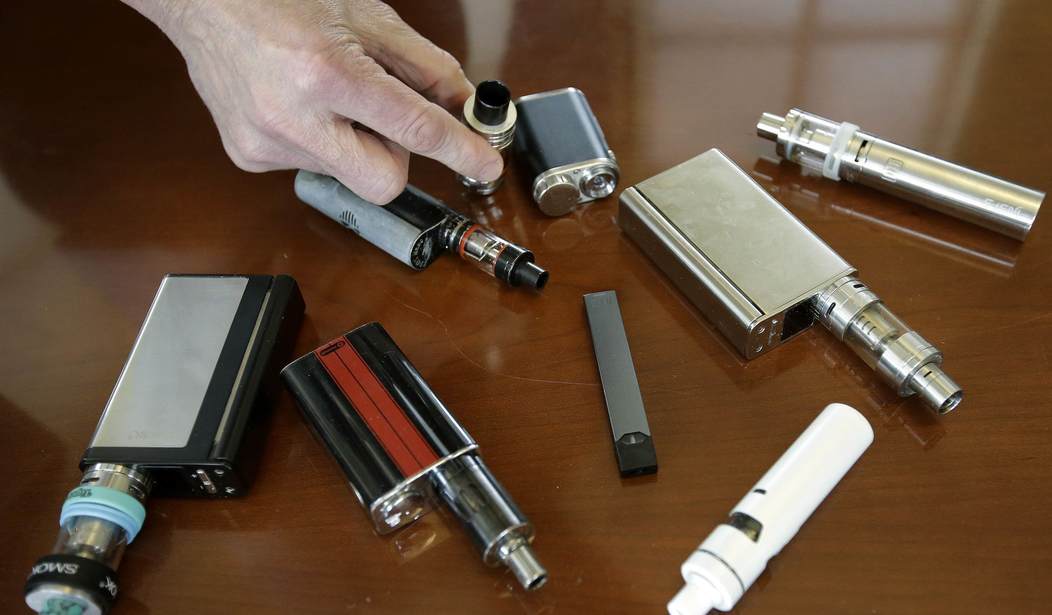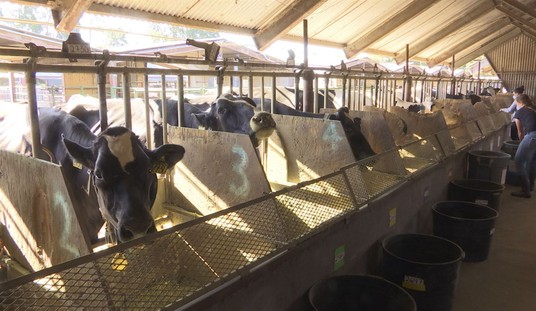In the classic 1979 comedy "The Jerk," Steve Martin plays a very dumb guy who often misses the point. In one scene, while he's working as a gas station attendant, an assassin tries to kill him with a high-powered rifle. When the bullets start whizzing past his head and popping holes in some motor oil cans, he immediately assumes the cans must be defective because they're spontaneously springing leaks. When the sniper is pointed out to him, he then concludes: "He hates these cans!" He then runs past a soda vending machine, and as the bullets rip into that, he shouts, "There are cans in there too!"
That 40-year-old scene comes to mind in part because that's how my middle-aged brain is wired, but also because I occasionally wonder whether American progressives have a similar feeling about gaseous or vaporous substances. Sometimes I shout at the TV, "They hate these gases!"
Consider vaping. We're in the middle of something close to a full-on moral panic about the practice. The president is considering taking drastic action against the nicotine delivery systems. New York Gov. Andrew Cuomo, who recently instituted an emergency ban on flavored vape products, says, "Vaping is dangerous, period."
There are so many bans on vaping and e-cigarettes that Wikipedia has a massive list of all the states, counties and towns that outlaw the allegedly pernicious devices. It's mostly offices, restaurants and bars, but you're also out of luck if you want to vape from the deck of a Washington state ferry.
Now, I sympathize with the effort to make it harder for nonsmoking minors to pick up vaping as a habit. And while I think the bans on flavored vape products aimed at kids will inevitably lead to a black market (a possibility that many of the same anti-vaping progressives concede when the issue is, say, drugs or prostitution), there's still room for reasonable regulations on that front.
It's also worth noting that nearly all moral panics begin with an argument about "the children," yet they rarely end there. Besides, bans on vaping in bars and workplaces aren't aimed at kids anyway.
That said, vaping is almost surely a huge public health boon because it helps people addicted to cigarettes quit. The National Academy of Sciences, the American Cancer Society and, yes, even the FDA have said that vaping is less harmful than smoking tobacco. My own mother, who tried to quit smoking many times over some six decades, only succeeded when she switched to e-cigarettes.
Recommended
The recent scare about a mysterious lung disease afflicting a handful of vapers isn't about the standard nicotine products but about the vaping of unregulated THC (the fun stuff in marijuana) products.
In almost every other realm of public health, harm reduction is a priority. That's why schools hand out condoms, why various cities give free needles to heroin users, etc. But for some reason, vaping doesn't count, at least not in America. Tellingly, in the United Kingdom, the government is much more supportive of vaping, at least in part because the U.K. has socialized medicine, and replacing cigarettes with vapor saves lives -- and money.
Now consider fracking. If climate change or air pollution are like cancer, burning coal is like smoking unfiltered Camels, and natural gas is like vaping. Yes, in the progressive vision of a perfect world, we'd kick our addiction to all fossil fuels overnight just like everyone would kick the nicotine habit. But if the aim is harm reduction, fracking has been yet another boon, not only reviving countless economically depressed areas and weening us off foreign oil but also significantly reducing our overall CO2 emissions.
There's a legitimate debate about how much the drop-off in CO2 emissions is directly attributable to fracking, but no one disputes that it's far better than coal or that coal-generated electricity is rapidly being phased out thanks to the natural gas boom.
And, as with vaping, the response is, "Not good enough! Let's ban it!" Indeed, Sen. Elizabeth Warren is so passionate about the fracking issue, she vows to unilaterally impose an illegal and unconstitutional ban on the practice the moment she's elected. (I guess Warren thinks she won't need Pennsylvania's electoral votes.)
I understand that progressives don't irrationally hate gasses and vapors. If they did, they might be more concerned about the breakneck pace of marijuana legalization. But it's weird how science and harm reduction are important lodestars for progressives, except when they aren't.

























Join the conversation as a VIP Member